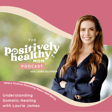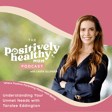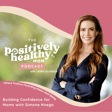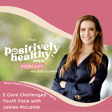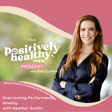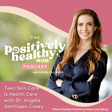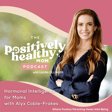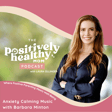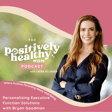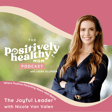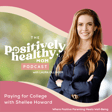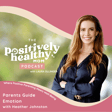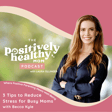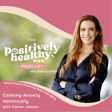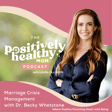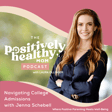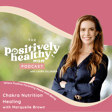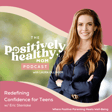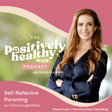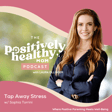Introduction and Self-Forgiveness Question
00:00:00
Speaker
Hey moms, it's Laura Olinger.
00:00:02
Speaker
Welcome to the Positively Healthy Mom podcast.
00:00:05
Speaker
This episode is part two of my conversation with Karine Zuleger, a transformation and mindset life coach.
00:00:15
Speaker
So I want to switch gears a little bit and get into some of like the, like, that was fun.
00:00:19
Speaker
Like I like talking about that, but I want to get into some of like the really like heavy stuff that people can't get elsewhere.
00:00:26
Speaker
Like this is why I have this show because they can get some real tools and resources and support just by listening to this.
00:00:34
Speaker
I have my own questions, but I see we did get a question that came in the chat from someone.
00:00:40
Speaker
And she said, what is one way to assist in forgiving yourself?
Journaling for Forgiveness
00:00:47
Speaker
So it's a process of journaling.
00:00:51
Speaker
So what you're going to do is you're going to write out all the different names that
00:01:00
Speaker
that the first portion of it is where you write all the different names of the different people that come immediately.
00:01:08
Speaker
It's like a rapid fire writing, right?
00:01:11
Speaker
So you're going to write 30 different names that immediately pop to your head of like people that you need to forgive.
00:01:19
Speaker
What was so interesting the first time I did this is how far back it went.
00:01:23
Speaker
It was like maybe four.
00:01:25
Speaker
And so it's pretty interesting when you're just sitting down and like, you know, I forget, oh, I forgive so-and-so for doing this, like in kindergarten, you know, or something, right.
00:01:32
Speaker
You don't realize you're carrying that in there, you know?
00:01:34
Speaker
And then there's a, there's a whole process that you go through in writing out that, you know, I lovingly forgive them, you know, release them.
00:01:42
Speaker
And then the second component of it is in the evening part of the day, you're going to write out, um,
00:01:50
Speaker
that you lovingly forgive yourself and all the names that are, you're used for, you know, that are used for you.
00:01:55
Speaker
So like for me, I had nicknames as a child, you know, or it might be mom or mama or, you know, my husband calls me baby or, you know, whatever, right.
00:02:07
Speaker
Whatever it was, all the different names that I have assumed for myself over the years that I lovingly forgive and release myself also.
00:02:17
Speaker
And it's just a, it's a process.
00:02:19
Speaker
that you go through and it's over a period of time.
00:02:23
Speaker
So you do it in the morning and you do it over at night and then you do it for seven days and we're looking at releasing, releasing
Health Consequences of Unforgiveness
00:02:33
Speaker
And the reason we, cause when we carry all of that inside of us, it causes health issues.
00:02:40
Speaker
Oh, I believe that.
00:02:42
Speaker
Right, because that goes into that stuffing and that suppressing.
00:02:44
Speaker
So not being able to forgive ourselves, you know, we're carrying around a burden we don't need to be carrying around.
00:02:51
Speaker
Because what's so interesting is that we will keep ourselves on the hook for something that happened 30 years ago that somebody else has that person who we think we need, you know, that we did something to.
00:03:08
Speaker
They're not even thinking about it.
00:03:09
Speaker
Yeah, it's not even on their radar.
00:03:12
Speaker
Yeah, it's not something that you ever need.
00:03:15
Speaker
In fact, I like to burn it.
00:03:19
Speaker
I just burn it and I allow it to be released.
00:03:22
Speaker
And, you know, because that really is, it's a conversation between you and your creator.
00:03:27
Speaker
You know, it's like, please forgive me.
00:03:28
Speaker
I did these things I need to be forgiven for.
00:03:31
Speaker
At least I believe that.
00:03:34
Speaker
And release it and release it.
00:03:36
Speaker
So every time it goes up in flames, I'm like, okay.
00:03:43
Speaker
I'm really curious about that process.
00:03:45
Speaker
Is there any benefit to going to the person or people if they're available in your life to have a conversation about that?
Approaching Others for Forgiveness
00:03:53
Speaker
Or would there be like, would that be good?
00:03:54
Speaker
Or what do you think?
00:03:56
Speaker
I think it depends on the situation.
00:03:58
Speaker
Often, what I like to ask for is what is the benefit of that?
00:04:05
Speaker
Because is that your ego talking?
00:04:07
Speaker
Is it the ego that wants to
00:04:09
Speaker
I need to be forgiven.
00:04:10
Speaker
Is that coming from a space of that?
00:04:13
Speaker
Or, you know, can I seek forgiveness, you know, do it through the creator, do it through the source, through energy exchange, as opposed to necessarily maybe going to somebody.
00:04:29
Speaker
If you believe that it's a situation where there can be reconciliations,
00:04:37
Speaker
And I guess that that would be a choice, right, that you could make.
00:04:41
Speaker
But I would really weigh the pros and cons and ask yourself, you know, really, is this ego talking, you know, or is this coming from my soul that I would like to have forgiveness for this?
00:04:54
Speaker
And just kind of see, like, what would the benefit of that be?
00:04:56
Speaker
You know, kind of explore that a little bit before you acted on everything, because, you know, the last thing you'd want to do is maybe cause more harm or more damage.
00:05:03
Speaker
You know, maybe assess and see where you are.
00:05:06
Speaker
And that's a great answer.
Major vs. Micro Traumas
00:05:08
Speaker
So, OK, so the next thing I was thinking of, you know, you mentioned way much earlier in the conversation about.
00:05:15
Speaker
you know, childhood trauma and how you're, you know, you have this kind of knowledge about, you know, zero to eight or, you know, early childhood.
00:05:23
Speaker
And so can you kind of just explain like, what is that even, I mean, I know in my own definition, what like, I think that means because I think there's, there's the extreme trauma.
00:05:33
Speaker
Like we think of like a major incident, you know, whether it's a fire or a divorce or abuse or this or that, but
00:05:39
Speaker
But there's also little like micro traumas, right?
00:05:41
Speaker
Like small things that build up that most people don't consider trauma, but it's just like, you know, it could be, oh, I got embarrassed in front of my class when I was doing show and tell when I was in first grade, but things like that built up, built up, built up, and it never got like resolved.
00:05:55
Speaker
And so it becomes trauma, right?
00:05:56
Speaker
So like when you talk about trauma, which type are you talking
Impact of ACEs on Health
00:06:00
Speaker
Or is it everything?
00:06:03
Speaker
I'm specifically addressing big T's.
00:06:05
Speaker
So when we're talking about adverse childhood experiences, this was a study that was done in the nineties.
00:06:14
Speaker
This particular study was done by two doctors, doctors Felitti and Anda.
00:06:19
Speaker
And they actually kind of like, they kind of, they were working in a weight loss situation.
00:06:25
Speaker
They were doing a weight loss study and happened to trip over, um,
00:06:32
Speaker
finding this information and then they dug deep.
00:06:36
Speaker
So what we're looking for, and I have a list of the questions here.
00:06:41
Speaker
So prior to your 18th birthday, did a parent or an adult in the house often swear at you, insult you, put you down, humiliate you?
00:06:51
Speaker
Question number two, did a parent or other adult in the house often push, slap, grab, throw things at you, injure you, ever hit you so hard that you were injured?
00:07:01
Speaker
The third one, did an adult or person five years older than you ever inappropriately touch you, you know, in any sort of sexual manner?
00:07:15
Speaker
Did you often feel that no one in your family loved you or thought that you were important or special?
00:07:21
Speaker
Did you often feel that...
00:07:26
Speaker
that you didn't have enough to eat or had to wear dirty clothes or that there was no one there to protect you.
00:07:33
Speaker
Were your parents who drunk or high to take care of you or take you to the doctor?
00:07:37
Speaker
Number six is were your parents ever separated or divorced?
00:07:43
Speaker
Seven was your mother or stepmother pushed, grabbed, slapped, or had things thrown at her.
00:07:48
Speaker
Was she ever physically harmed in front of you, repeatedly threatened?
00:07:55
Speaker
Number eight, did you ever live with anyone who was a problem drinker or alcoholic or used street drugs?
00:08:01
Speaker
Number nine, was a household member depressed or mentally ill or did a household member attempt suicide?
00:08:07
Speaker
And number 10, did a household member go to prison?
Stress Hormones and Long-term Health
00:08:11
Speaker
So with those, with adverse childhood experiences, what that does is they use the analogy of having the bear live in your cave.
00:08:22
Speaker
So our bodies are built
00:08:25
Speaker
fight or flight, right?
00:08:27
Speaker
Or freeze or fawn.
00:08:31
Speaker
But when the bear lives in your cave, there's no escaping.
00:08:35
Speaker
And so the body is in perpetual fight or flight.
00:08:40
Speaker
So what happens is the body is flooded with cortisol and flooded with adrenaline.
00:08:44
Speaker
And when we are flooded with those hormones, the long-term exposure to that
00:08:53
Speaker
causes health repercussions that may not be seen until down the line or in children, you might see, they might be asthmatic, right?
00:09:02
Speaker
They might be having night terrors.
Coping Mechanisms and Neuro Encoding
00:09:05
Speaker
Um, there might be bedwetting.
00:09:07
Speaker
Um, you know, there's different things like that that can happen.
00:09:10
Speaker
Um, you were talking like a little bit of like the microaggressions.
00:09:14
Speaker
Um, you know, the, the second part of this that they look at is, you know, was the child in foster care?
00:09:23
Speaker
Did they experience harassment or bullying at school?
00:09:27
Speaker
Did the child live with a parent or guardian that died?
00:09:31
Speaker
Was the child separated from their primary caregiver through deportation or immigration?
00:09:36
Speaker
Did the child ever have a serious medical procedure or a life-threatening illness?
00:09:44
Speaker
Did they hear something violent or something awful happen within their neighborhood?
00:09:50
Speaker
Cause you know, there's kids that walk to school that it's not safe, right?
00:09:54
Speaker
Was your child treated badly because of race, sexual orientation, place of birth, disability, religion.
00:10:00
Speaker
I mean, you and I talked about, you know, sexual orientation.
00:10:03
Speaker
It's like one of the highest reasons why kids commit suicide, you know, because they're being bullied for it, you know?
00:10:10
Speaker
So these things feed into, it all goes to our sympathetic nervous system.
00:10:17
Speaker
They become dysregulated.
00:10:20
Speaker
And when our bodies are dysregulated, we choose things to numb.
00:10:28
Speaker
What happens is the more we use of that substance to numb or to feel good to release a dopamine to our brain, because that's what food or drugs or alcohol or shopping or that's what's happening.
00:10:40
Speaker
Every time you do it, it lessens the receptivity to the receptor.
00:10:49
Speaker
The more you do it, it wears it down and it wears it down.
00:10:51
Speaker
Then you need more and then you need more and then you need more.
00:10:55
Speaker
So exploring this is, is important because we can, we have the ability within us.
00:11:05
Speaker
This is where neuro encoding comes in.
00:11:06
Speaker
It's been super helpful.
00:11:08
Speaker
And the ramp technique that I use for the subconscious, because from birth till eight years old, we're,
00:11:15
Speaker
a pretty blank canvas.
00:11:17
Speaker
We don't have the prefrontal cortex of the brain developed yet.
00:11:22
Speaker
And so everything gets stored in the subconscious brain.
00:11:27
Speaker
What they see, what they smell, what they taste, what they touch.
00:11:30
Speaker
It can be from TV.
00:11:32
Speaker
It could be from music.
00:11:33
Speaker
It could be from the neighbors.
00:11:34
Speaker
It could be from kids at school, but it all gets stored in there.
00:11:38
Speaker
So you may not have a conscious awareness of what's in there, right?
Karine's Personal Story and Encouragement
00:11:43
Speaker
But it's wreaking havoc.
00:11:49
Speaker
That's what happened to me.
00:11:50
Speaker
Just actually a few months ago, I went to the doctor and she's like, how's your stress level?
00:11:55
Speaker
And I'm like, I don't have stress.
00:11:57
Speaker
I work for myself.
00:11:58
Speaker
My life is fantastic.
00:12:00
Speaker
I have an amazing husband.
00:12:01
Speaker
I have three beautiful children.
00:12:02
Speaker
You know, my life is great.
00:12:05
Speaker
And she goes, Hmm, that's really interesting.
00:12:08
Speaker
That's not what your blood work says.
00:12:12
Speaker
And I was like, what, what?
00:12:15
Speaker
So I was a little shook.
00:12:17
Speaker
Um, but there's, there's so much that we can do.
00:12:19
Speaker
So when we start to heal these things within our body, meditation, cause we can grow our telomeres.
00:12:25
Speaker
That's a whole, I could give you a whole science of, right.
00:12:31
Speaker
Um, but things like meditation, um,
00:12:36
Speaker
just, you know, just sitting in nature, right?
00:12:38
Speaker
Because sitting in nature is a form of meditation.
00:12:42
Speaker
Again, you know, connecting with people, our skin was made to be touched.
00:12:47
Speaker
We were made and wired as human beings to connect.
00:12:53
Speaker
I cannot stress the importance of that enough because isolation is another killer of people.
00:13:01
Speaker
You know, getting into I could talk forever about at first childhood experiences and the importance of it for me.
00:13:08
Speaker
You know, healing, obviously, a personal journey and then also healing the trauma itself.
00:13:19
Speaker
I don't go deep with people.
00:13:21
Speaker
I'm not I'm not here to dig up all the old stuff and then we live.
00:13:26
Speaker
OK, we have an awareness of it.
00:13:29
Speaker
let's take it and we're gonna lessen the vibration of it, and give it a little bit of a look and help you move forward in your life.
00:13:42
Speaker
And that to me has been such a rewarding component of it is being able to see people step into things and out of situations where they didn't think it was ever possible.
00:13:59
Speaker
to have a different life, right?
00:14:01
Speaker
So I draw a circle.
00:14:03
Speaker
You live in this circle and all the people in your circle are the same, right?
00:14:09
Speaker
Because that's your community.
00:14:14
Speaker
Until somebody jumps out of the circle, steps a toll out of the circle, right?
00:14:18
Speaker
We don't know life looks any different.
00:14:20
Speaker
How do I know it looks any different?
00:14:22
Speaker
You know, if this is the way everybody around me behaves.
00:14:25
Speaker
But now all of a sudden I put my toe out there and I see there's a, Oh, there's a whole different world out there.
00:14:30
Speaker
And I want more of that.
00:14:31
Speaker
And I want more of that.
00:14:33
Speaker
And then my hope is, is that everybody within the circle is going to take a look at me and go, wow, look at her, look at her and how she changed her life.
Importance of Early Intervention
00:14:46
Speaker
It's, if that's possible for her, you know, if, if she can come from, you know, I,
00:14:53
Speaker
I had two paths before me, Laura, but I was told of this, you know, I knew, I knew my dad drank a lot, understand, you know, got to be in my teen years and started to understand the word alcoholic.
00:15:07
Speaker
I was able to separate the being from the behavior.
00:15:10
Speaker
I see that, that alcohol now in a whole different light.
00:15:17
Speaker
Or my mom who really struggled with a dealing with that and then B,
00:15:23
Speaker
you know, was it mental illness or was it a mental health issue because she wasn't living the life of her dreams, right?
00:15:33
Speaker
She wasn't, she wasn't out with friends.
00:15:36
Speaker
She wasn't allowed to have like, you know, there's so much that goes into that, right?
00:15:39
Speaker
So looking at, those were my two paths.
00:15:42
Speaker
And I was like, huh, but you know, like I wanted more.
00:15:47
Speaker
I wanted, I wanted different.
00:15:54
Speaker
the secrets that we keep as women, the secrets that we keep, that we keep stuffing down, you know, the shame, the guilt, the jealousy, the envy, the, the secrets that we keep from, you know, what's, what's going on within the walls of our house.
00:16:10
Speaker
The, you know, we stuff them down and we stuff them down and we stuff them down and then they perpetuate themselves as illness.
00:16:17
Speaker
I just, I'm here to blow the lid off all of that.
00:16:20
Speaker
And like you said, you know, we can't go out and I'm going to, you know, I'm going to be having open conversations.
00:16:25
Speaker
I've got a podcast coming called the secret keepers.
00:16:28
Speaker
And, and this is about having open conversations around.
00:16:33
Speaker
These are the secrets I kept.
00:16:34
Speaker
This is what I believed.
00:16:36
Speaker
This is how I healed.
00:16:37
Speaker
It's not just kind of an open up like grumble session.
00:16:40
Speaker
It's going to be like, this is the path I took.
00:16:43
Speaker
To heal this, you know, whatever was in me.
00:16:46
Speaker
So, you know, it's going to be.
00:16:51
Speaker
And I so appreciate you sharing all that.
00:16:54
Speaker
And I, you know, I'm a visual person.
00:16:56
Speaker
So as you talk, I imagine all these things and, you know, the ACE, I know it's called ACE.
00:17:03
Speaker
The adverse childhood experiences.
00:17:06
Speaker
I mean, I've seen that and I, you know, relate that to the education that I have, the master, I have a master's in education, health and wellness.
00:17:14
Speaker
So I did study that a lot and how,
00:17:16
Speaker
that does affect not just like you're kind of talking about it in the context of being an adult, right?
00:17:21
Speaker
The trauma as an adult, but like in my mind, I'm thinking of the, still the kid, I'm still thinking of the teenager and how they're trying, or, you know, younger kid, you know, elementary, going to school and they're trying to learn and learn if your limbic system is on fire and all your, you know, your,
00:17:42
Speaker
your prefrontal cortex is like offline and you're in that fight or flight stage.
00:17:46
Speaker
Like you're saying, like, you know, the, the, the sympathetic nervous system is just going berserk, right?
00:17:51
Speaker
Your memory, your retention, your learning is just not available.
Supporting Teenagers Through Trauma
00:17:55
Speaker
And so then what happens is that like, and I think I might be veering off track a little bit, but it just feels really important right now is then what happens is those kids, if they start to make bad grades or they get diagnosed with a learning disability, anything like that, then they're kind of like labeled as the trouble children or the problem.
00:18:12
Speaker
And they're getting like, you know, detentions and they're getting caught for substances and drugs when really what they need is something before that.
00:18:23
Speaker
They need some healing.
00:18:24
Speaker
They need some care.
00:18:26
Speaker
They need some, they need the bear to be out of the cave.
00:18:29
Speaker
Like you said, like I love that analogy and we can't always, we can't control their feelings.
00:18:33
Speaker
We can't take the bear out of the cave, but what we can do is care for the kids that are available to us.
00:18:39
Speaker
So that's why I'm really passionate about helping people
00:18:42
Speaker
you know, teenagers, and I don't specifically deal with trauma, although I'm capable of it.
00:18:45
Speaker
That's not specifically what I do.
00:18:47
Speaker
But if that is a struggle that someone's dealing with, I'm like, well, I want to help them because then it's setting up, like you said, like this path on your life, like, right, you have this path, and you have this path, or you have this path.
00:18:59
Speaker
It's like, I try to get to the path as soon as possible.
00:19:02
Speaker
You know, I work with I've had as young as a nine year old client, but I typically 13 to 16 or 19.
00:19:06
Speaker
I have some college kids,
00:19:09
Speaker
their clients and i try to get them on the right path so by the time they get to adulthood right they they're not as in that kind of painful space so to speak like whatever that is like the hard space the one that they're still fight or flight everything that you're talking about so you know i think it's awesome because you and i we both help people and we both want to heal people and we both want to give
00:19:32
Speaker
um hope to people and i love the analogy of the toe outside of the circle it's like oh then other people can see that that's possible like all you need to get one little toe and i want a better life and i can be like this and be an inspiration to people so i feel like what you're doing is beautiful and it's fantastic and cindy is saying hello youtube angus and beautiful women oh my gosh it's so great to hear from you oh we have a hello ladies how fun oh it's oh there's lots of people saying hi hi
00:19:59
Speaker
Oh, lots of emojis, lots of hearts and fire.
Healing Women's Trauma for Future Generations
00:20:05
Speaker
So we got to rename your upcoming podcast, The Secret Keepers.
00:20:09
Speaker
So that's so cool.
00:20:10
Speaker
I didn't actually know that about you.
00:20:11
Speaker
I'm really excited.
00:20:12
Speaker
I can't wait to find out about that.
00:20:15
Speaker
Okay, so man, I know I kind of jumped off track there for a second.
00:20:19
Speaker
I just threw the plane out the window, but I get excited when I hear what you're doing.
00:20:25
Speaker
And I feel like you are such an awesome example because you've lived this life, you've experienced it, and now you're on the other side.
00:20:33
Speaker
You've completely transformed yourself.
00:20:36
Speaker
And so therefore you're able to help, you know, women.
00:20:38
Speaker
So, um, I guess that would be kind of, you know, I know we're getting close on time.
00:20:42
Speaker
Like I know in the past you did work with kids, but who do you typically work with now?
00:20:46
Speaker
Like what is your ideal client that you do work with?
00:20:51
Speaker
Um, I have an umbrella.
00:20:53
Speaker
Um, I have an umbrella.
00:20:56
Speaker
Um, so women, moms, teens.
00:21:03
Speaker
I spent 15 years working with kids in the school and I just can't say it enough.
00:21:10
Speaker
All it takes is one adult, one trusted adult to change the trajectory of a child.
00:21:16
Speaker
That's all it takes.
00:21:18
Speaker
And we can be that one.
00:21:20
Speaker
And as a mom, we can really have such an impact.
00:21:26
Speaker
And I feel like if we could just.
00:21:28
Speaker
band together in in lack of arms because, you know, we're protective of our children and, you know, through all walks of life, you know, even even through seeing, you know, women that, you know, have gone through substance abuse.
00:21:45
Speaker
It's not that they don't love their kids.
00:21:46
Speaker
It's that they don't love themselves.
00:21:49
Speaker
You know, and so having that understanding really, it gives you a different perspective, right?
00:21:55
Speaker
So I think it is important, you know, to get the woman, if we can, ideally, this is what I see, right?
00:22:05
Speaker
If we can help a young woman heal prior to having children.
00:22:13
Speaker
That to me, high five, high five.
00:22:15
Speaker
So what you're doing with teenagers is amazing, right?
00:22:18
Speaker
Because that's so important, right?
00:22:19
Speaker
So because from that epigenetic component of it too,
Communal Responsibility and Women's Role
00:22:23
Speaker
We can pass some of this stuff on.
00:22:27
Speaker
So ideally that would be right.
00:22:28
Speaker
The place to start, but working with women to help other women to, to show that we can, we can heal this.
00:22:35
Speaker
We can lock our arms together.
00:22:36
Speaker
We can say, you know what?
00:22:40
Speaker
I used to hear not my kid, not my problem.
00:22:42
Speaker
but it is our kids.
00:22:44
Speaker
They are our problem, all of them, even if they aren't biologically yours, we have an impact.
00:22:52
Speaker
And I just feel like we can come together and just tackle this.
00:22:56
Speaker
So I just, it excites me.
00:22:59
Speaker
It like, it sets my soul on fire because I believe we're coming from such a loving space that, you know, this healing we started, you know,
00:23:09
Speaker
started with the women, started with the kids, you know, like, it's just, it's so beautiful to me.
00:23:17
Speaker
I love what you just said.
00:23:18
Speaker
It got me goosebumps because I feel like moms are the most untapped resource on this
Mothers as Emotional Leaders
00:23:30
Speaker
We have so much power that we have.
00:23:33
Speaker
We have so much power and we don't know it or we don't use it or we don't know how.
00:23:40
Speaker
Like we just don't know what we don't know.
00:23:42
Speaker
And I think like I'm starting to see, you know, the way I've impacted my clients, you know, who are headed on this different trajectory or, you know, I look back at my own path and I thought, oh man, if only I'd had a coach.
00:23:57
Speaker
You know, when I was 13 years old and I was so insecure, so critical of myself.
00:24:04
Speaker
And I brought that negative dialogue, you know, log that I had in my head to my adulthood.
00:24:10
Speaker
And I brought that to a marriage and, you know, all the unhealthy stuff.
00:24:13
Speaker
And I'm like, ah, we can be, like, I feel like we're like the, like, we are the emotional mothership, you know, of this woman.
00:24:24
Speaker
I just made that up.
00:24:28
Speaker
In a family, you know, typically, you know, the women, the moms are, you know, the, the head of the household as far as emotions go.
00:24:35
Speaker
And we can be leaders in this, like we can help people.
00:24:38
Speaker
We can, we can reach out, you know, and like you said, at the very beginning of this, you said, there's no like, like a negative emotion doesn't mean it's a bad emotion.
00:24:46
Speaker
Like for me, it's, you said, it's just information.
00:24:49
Speaker
It's just like, yeah,
00:24:50
Speaker
It's a signal that something needs attention.
00:24:52
Speaker
That's all we know that needs.
Advice for Struggling Moms
00:24:54
Speaker
Okay, so we are just about out of time.
00:24:56
Speaker
So Karine, how can people find you after today?
00:24:58
Speaker
Because you're just like literally a wealth of knowledge.
00:25:02
Speaker
I feel like I'm just getting so excited at the end here because we're running out of time and I want to hear more.
00:25:08
Speaker
How can people find you after today?
00:25:11
Speaker
Um, I think you can find me, um, on Instagram, um, at it's Kareen underscore Zulegger.
00:25:18
Speaker
Um, or my website is just, it's Kareen Zulegger.com.
00:25:26
Speaker
Well, last thing, any last, like if you had to give one piece of advice to a mom who's struggling today, right now, what could be that one thing she could do?
00:25:37
Speaker
I want her to look in the mirror.
00:25:39
Speaker
I want her to look eyeball to eyeball.
00:25:41
Speaker
I want her to take her hands in her face in her hands.
00:25:45
Speaker
And I want her to say her name.
00:25:48
Speaker
So Corrine, I love you and smile.
00:25:55
Speaker
Then celebrate it.
00:25:57
Speaker
Pat your back, shake your booty, put some good music on and shake it around.
00:26:01
Speaker
I just start there.
00:26:05
Speaker
I am the love of my life.
00:26:08
Speaker
and it starts here, right?
00:26:09
Speaker
We want to set that example for our children.
00:26:12
Speaker
We want to show them healthy ways to deal with our emotions, right?
00:26:15
Speaker
Because they're there, they're real.
00:26:16
Speaker
We get to acknowledge them.
00:26:18
Speaker
You know, am I going to go for a walk?
00:26:19
Speaker
Am I going to put on some good music?
00:26:21
Speaker
Am I going to color?
00:26:22
Speaker
Am I going to meditate?
00:26:23
Speaker
You know, am I going to cook some healthy food?
00:26:26
Speaker
You know, what can I do?
00:26:28
Speaker
Get out in nature, you know, take a nice warm bath.
00:26:32
Speaker
You know, except, you know, besides blow up and, you know,
00:26:36
Speaker
who's my cool, right?
00:26:38
Speaker
Because that is exactly the transformation that we need to be from like victims of our state that we're in or our situation or our circumstances to victors and leaders and, you know, having that power back that we need to heal ourselves and be such a great example and role model for our kids.
00:26:56
Speaker
And, um, okay, well that's it.
00:26:58
Speaker
Thank you so much, Corrine today for sharing everything and being so vulnerable, vulnerable and open and, you know, sharing your story.
00:27:05
Speaker
Cause I, and I know there's so much more to it.
00:27:07
Speaker
We didn't get to touch on today, but you're
Conclusion and Listener Encouragement
00:27:11
Speaker
Thank you for listening to the positively healthy mom podcast, because there's no manual for the hardest job in the world.
00:27:18
Speaker
Don't forget to subscribe and share with your friends.

